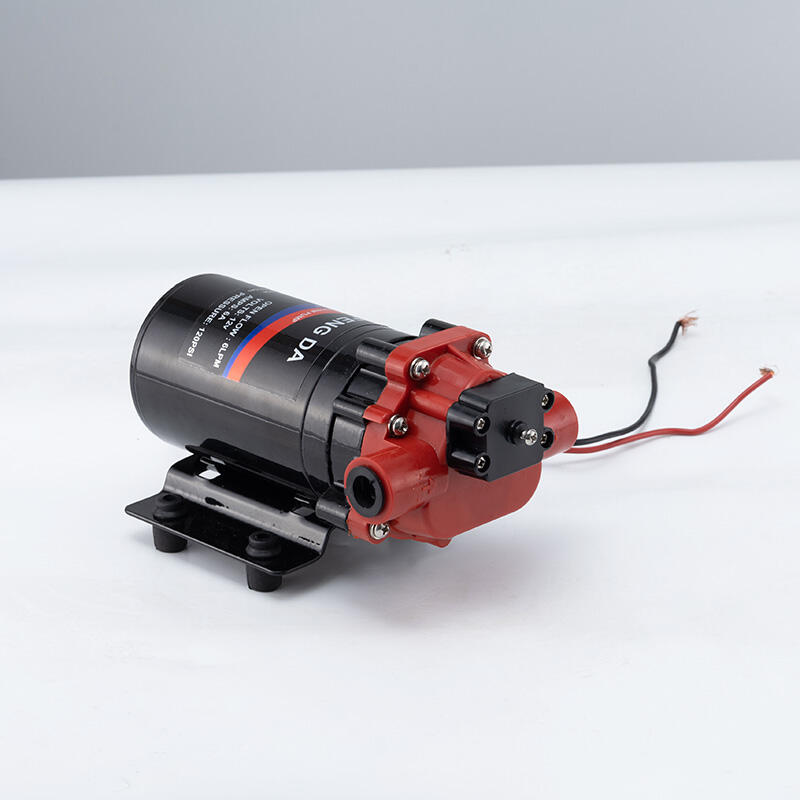High-Pressure Diaphragm Pumps: Powering Modern Agricultural Irrigation
Overcoming Gravity: Water Distribution in Mountainous Terrains
High-pressure diaphragm pumps play a pivotal role in addressing the challenges posed by uneven landscapes in mountainous agricultural regions. These pumps effectively overcome gravity and varying elevations, ensuring water reaches even the most hard-to-access locations. By maintaining powerful head pressure, these pumps deliver water efficiently across long distances without losing efficiency. The construction materials of these pumps are vital for their performance; corrosion-resistant options significantly enhance longevity across diverse irrigation scenarios. Real-world studies indicate that using high-pressure diaphragm pumps in such terrains can improve crop yields by up to 30%, thanks to better water availability, which ultimately supports healthy plant growth and root development.
Stable Pressure Delivery for Uniform Crop Spraying
Stable pressure delivery systems are crucial for achieving uniform spray patterns required for effective pest control and nutrient application in agriculture. High-pressure diaphragm pumps ensure consistent pressure, reducing variability in water distribution, thereby optimizing crop conditions. Research illustrates that uniform application not only bolsters crop growth but also decreases the quantities of pesticide and fertilizer needed, leading to more eco-friendly farming practices. Successful integration of these pumps in spraying operations has been associated with enhanced profitability and sustainability for farmers, as less chemical input minimizes operational costs while promoting healthier ecosystems. By maintaining optimal spray rates, high-pressure diaphragm pumps contribute significantly to precision agriculture practices.
Energy Efficiency & Water Conservation Advantages
Precision Irrigation Through Pressure Control
Diaphragm pumps are pivotal in precision irrigation, offering precise pressure control that ensures targeted water delivery, minimizing waste. By controlling water flow with precision, these pumps can achieve up to 40% water savings compared to traditional irrigation methods. This efficiency not only benefits the environment but also improves farmers' profitability by reducing water usage costs. Moreover, such efficient water management helps maintain optimal soil moisture levels, promoting healthier crop growth and reducing overall irrigation expenses. In turn, this approach supports sustainable agricultural practices and resource conservation, highlighting the integral role of high-pressure diaphragm pumps and agricultural irrigation pumps in modern farming.
Frequency Conversion Technology for Reduced Power Consumption
Modern diaphragm pumps incorporate frequency conversion technology, enabling real-time adjustments to the pump's output, which significantly reduces power consumption. Studies have shown that these pumps can lower energy use by up to 50% during peak irrigation times, promoting substantial cost savings for farmers. This technology not only helps in reducing operational expenses but also aligns with sustainable agricultural practices by lowering the carbon footprint of farming activities. The adoption of high-pressure diaphragm pumps, especially those designed as electric sprayers for agriculture, thus becomes a strategic decision for enhancing energy efficiency in irrigation systems, contributing to both economic and environmental goals.
Durability in Challenging Farming Conditions
Handling Abrasive Sediments in Water Sources
High-pressure diaphragm pumps are engineered with robust materials, enabling them to withstand abrasive particles present in many agricultural water sources. This durability is crucial for maintaining efficient operations, as pumps can often encounter sedimentary materials that would otherwise cause clogs in conventional systems. Modern diaphragm pumps mitigate these risks, ensuring extended operational life and minimizing repair downtime. For instance, statistical analysis highlights how these pumps exhibit a significantly lower failure rate compared to traditional pumps, underscoring their effectiveness in abrasive environments.
Dry-Run Capabilities for Uninterrupted Operations
One of the distinguishing features of high-pressure diaphragm pumps is their ability to operate under dry conditions without incurring damage—a capability known as dry-run. This feature is particularly advantageous for farms that experience inconsistent water supplies, as it prevents costly equipment failures and ensures a reliable irrigation schedule. By leveraging dry-run capabilities, farmers can maintain uninterrupted operations, guaranteeing that crops receive the necessary water without delays. This reduces the risk of water stress and enhances overall crop health.
Integration With Precision Farming Systems
Fertilizer Application Synchronized With Irrigation
High-pressure diaphragm pumps seamlessly integrate with modern precision farming systems to synchronize water and fertilizer application. This synchronization significantly enhances nutrient uptake by crops and reduces fertilizer runoff, promoting eco-friendly farming practices. Studies indicate that such synchronized application can improve crop yield by at least 20%, while minimizing environmental impact. By using advanced systems like fertilizer applicators alongside agricultural irrigation pumps, farmers can efficiently manage resources and ensure optimal plant growth.
Electric Sprayer Compatibility for Orchards
The compatibility of high-pressure diaphragm pumps with electric sprayers is an essential feature for modern orchards. This compatibility allows for efficient spraying of pesticides and herbicides, optimizing crop protection efforts without overuse. Farmers adopting this technology often report improved efficiency and reduced chemical use, aligning with sustainable farming principles. An electric sprayer for agriculture integrated with these pumps provides powerful support for orchard management, ensuring uniform spraying and healthier crops.
Comparative Advantages Over Centrifugal Pumps
Superior Self-Priming Performance
High-pressure diaphragm pumps offer superior self-priming capabilities, making them ideal for irrigation systems that require suction lift. This advantage enhances seamless installation and user-friendliness in various agricultural settings, thereby reducing initial setup costs significantly. Additionally, comparative studies have demonstrated that diaphragm pumps outperform centrifugal pumps in self-priming tests, enabling faster setup times for farmers and delivering operational efficiencies that are critical in time-sensitive agricultural processes.
Maintenance Advantages in Remote Locations
The robust design of diaphragm pumps, characterized by fewer moving parts, translates into lower maintenance requirements, particularly advantageous for remote farming locations. This design choice enhances reliability, ensuring that farmers can maintain productivity with reduced downtime. Expert testimonials affirm this advantage, highlighting substantial reductions in maintenance visits and associated costs. Such reliability is critical in isolated areas, where access to technical support can be limited, thus maximizing the uptime and effectiveness of agricultural operations.

